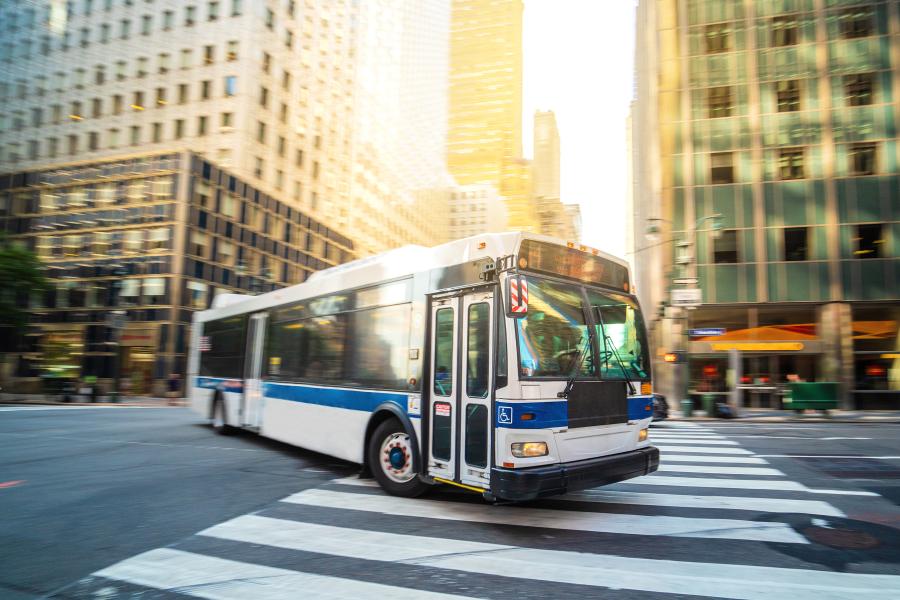In a country of suburban sprawl and endless highways, most Americans need a car in order to complete such basic tasks as going to work, getting groceries, and seeing the doctor. Those without cars are at the mercy of uneven sidewalks and unpredictable transit systems, meaning they don't often get where they need to go, says Megan Latshaw, associate professor in the Department of Environmental Health and Engineering at the Johns Hopkins Bloomberg School of Public Health.
Latshaw has examined the health and environmental impacts of unreliable transportation in Baltimore, including partnering with the Baltimore Transit Equity Coalition (BTEC) to create maps on transportation, access, vulnerability, air pollution, and health. BTEC credits that report in part with helping to pass Maryland's Transit Equity Act of 2023.
Latshaw is currently working on a new report that will expand beyond Baltimore City to the surrounding counties. She's also partnering with an applied math team in the Whiting School of Engineering, led by Fadil Santosa, on an analysis of how many jobs the Red Line—a proposed light rail line to connect East and West Baltimore—would bring to Baltimore.
Here, Latshaw discusses a new CDC report showing that 5.7% of American adults didn't have access to reliable transportation in 2022, a predicament that not only hampers mobility, but also has far-reaching public health implications.
Can you give us an overview of the CDC's new report on reliable transportation?
The CDC report looked at access to transportation, specifically how that impacts health and health care access. For example, can Americans get to their doctors' appointments? They found that about 15 million American adults—5.7% of the adult population—face unreliable transportation. But it's not just about access to health care appointments; it's also about access to healthy food, education, and jobs. Also, transportation links to health in other ways. If we reduce reliance on cars, then we're also reducing air pollution and greenhouse gasses, and we're also increasing physical activity. Transportation has so many different impacts on our health.
Why is reliable transportation a public health issue?
We've built America around cars. If you want to get anywhere in the U.S., unless you live in a downtown area, you need to jump in your car to get there. It's unsustainable, and it's not healthy, so we need to figure out a way to move past cars. Doing so will reduce air pollution, reduce greenhouse gases, and also get people walking and biking. And when you take public transportation, it's a social activity, if you think about it. There are other people around you, and even if you're not chatting with them, you're at least spending time with people from your community. So there's many different benefits.
What are the effects of unreliable transportation?
There are many stories about its impact on individuals, especially here in Baltimore. There have been a couple of articles about how Baltimore City students have to take public transit, and they report being harassed. They report being late to school. And so here are kids, the future of our country, the future of our city, and they can't even get a good education because the transportation is unreliable. And then think about the elderly who are managing a lot of chronic health conditions: If they don't show up for their appointments—if, for example, they're on kidney dialysis or have diabetes that they need to manage—they're going to get sicker and sicker, and then it's not good for them, it's not good for the system.
And then when it comes to job access, in Maryland, if a bus is less than seven minutes late, it's considered on time. But if you have to transfer to another bus and your first bus is seven minutes late, you're probably going to miss your second bus. In a lot of lower-paying jobs, if you're late to work three times, you're out of a job. And so here we are in America, a country that's all about jobs and economic access, but we're not even getting people who want to work to their jobs. We are throwing these barriers in their way.
What are some ways cities—like Baltimore, where transit exists but is subpar—could improve existing public transportation systems?
We have to invest in public transit. I always say, instead of building up and broadening highways, we need to build better transportation systems. We can't get rid of cars tomorrow, but people aren't going to start using public transportation until it's reliable. Once we get it there, maybe then we can start to discourage car use.
What kind of transportation policy do you hope to see come from this data?
President Hoover had a campaign ad mentioning a car in every yard and a chicken in every pot. I'd like to see an ad calling for "a transit stop near every home." Not just a transit stop near your home, but a reliable transit system where it's going to come on time and an app that has live feed data. We need to make transit the easy choice, as opposed cars.
Posted in Health
Tagged public health, transportation








